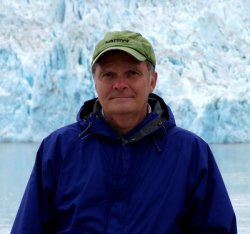Richard A. Volkert ’84 MA
Leading Expert in the geology of New Jersey
Posted in:

Richard A. Volkert ’84 MA is a leading expert in the geology of New Jersey and recently retired research scientist at the New Jersey Geological and Water Survey. His accomplishments include developing a new theory for the origin of the Franklin zinc deposits using stable isotopes; identifying the oldest rocks in New Jersey dated at 1.37 billion years; unraveling the billion-year geologic history of the Highlands region; discovering the oldest fossils in the state dated at 1.29 billion years; and being part of a team that mapped the geology of the state and co-authored the 1996 geologic map of New Jersey, which replaced the outdated 1910 geologic map. During his 30-year career, he has provided technical assistance to various federal, state and municipal agencies, private engineering and geologic consulting firms and the general public.
The author of more than 125 scientific publications including peer-reviewed journal papers and geologic maps, his work involves the collection and interpretation of geologic data for applied purposes such as engineering projects and the mitigation of geologic hazards from faults, abandoned mines, slope instability, radon, asbestos and geochemical contaminants.
“During my time as a graduate student in the Montclair State University Department of Geoscience, I found that the course content, lab work, and abundant excursions into the field to apply the knowledge acquired were incredibly helpful in preparing me for a career as a geologist. After graduation, I was hired by the New Jersey Geological Survey as a field geologist to map the bedrock geology of the state, which was one of my primary responsibilities for three decades,” says Volkert. “However, the demands of the job were often quite varied, so the breadth of the course content, coupled with ample exposure to field work, were adequate preparation for my career. In some instances, I actually felt better prepared than colleagues who had degrees from Ivy League schools.
As a commuting graduate student who was married with two small children, Volkert was left with time for little beyond the classroom and library. He notes that a fond and lasting memory was the feeling of elation at being accepted to the Department of Geosciences. “This afforded me the chance to fulfill a childhood dream of becoming a geologist”, says Volkert.
That feeling of belonging was strengthened by faculty of the department, and Volkert remains closely connected to professors in the classroom today.
“I was influenced considerably by Department of Geoscience faculty, namely professors Robert Ramsdell and Charles Hamilton. They were outstanding educators who were passionate about teaching and expanding student’s minds with their respective areas of expertise. I was inspired by both to avoid complacency and to push myself to excel academically,” says Volkert. “In more recent years I have been fortunate to maintain a close working relationship with professor Matt Gorring of the Montclair State Department of Earth and Environmental Studies. His selfless dedication to teaching and guiding students in their research studies continues to be a source of inspiration for me.”
In May 2014, Volkert was awarded the Distinguished Alumni Award by The Graduate School at Montclair State. “I was deeply honored to be awarded the Graduate School’s Distinguished Alumni Award. Working for the government, one expects to toil their entire career in relative obscurity. Perhaps for this reason the award meant so much to me because I was being recognized by my alma mater for career achievements,” notes Volkert. “I saw this award as an opportunity to convey to students the fact that anyone can be successful with the right amount of hard work and perseverance.”
When asked what advice he would give to current students looking to break into the field of geology, Volkert says that studying and being prepared are crucial. “My advice is to study hard, take varied course work both in your major and in peripheral areas, become proficient in GIS applications and in the lab with all of the equipment and techniques at your disposal. Become as comfortable as possible in the field with bedrock, surficial and hydrogeologic processes, and how they relate to environmental issues,” says Volkert, and adds, “Learn to integrate and apply lab-based and field-based data to solve geologic and environmental problems.”
